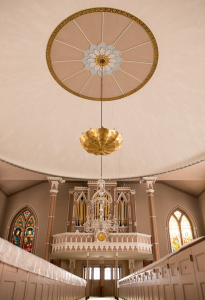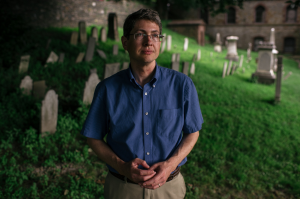About our new partnership to form the Center for Reconciliation
Posted August 24th, 2015 by James DeWolf PerryCategory: News and Announcements, Outreach, Public History Tags: Episcopal Church, James DeWolf, Providence, Rhode Island, Slave trade, Traces of the Trade
 Today the New York Times is running an article on our partnership to create a Center for Reconciliation in the Episcopal cathedral in Providence, R.I.
Today the New York Times is running an article on our partnership to create a Center for Reconciliation in the Episcopal cathedral in Providence, R.I.
The article, by Katharine Seelye, is headlined “Rhode Island Church Taking Unusual Step to Illuminate Its Slavery Role.” Seelye discusses our plans to offer a museum interpreting slavery and the slave trade in Rhode Island, and the North, with emphasis on the historical complicity of the entire nation, including the Episcopal Church, in the institution of slavery. She also talks about our intent to offer programming and community activities aimed at educating the general public and fostering dialogue, healing, and reconciliation.
The article details how the DeWolf family’s efforts to illuminate their slave-trading past in Rhode Island, including Katrina Browne’s PBS documentary, “Traces of the Trade,” have helped to inspire the Episcopal Diocese to put forward the idea for the Center for Reconciliation.
The Rt. Rev. Nicholas Knisely, the Episcopal Bishop of Rhode Island, is quoted in the article on the importance of acknowledging the ways in which the Church knowingly benefited from slavery, as well as eventually playing a role in abolition:
“We sounded an uncertain trumpet. We were happy to receive their financial support. We allowed ourselves to be convinced by the prejudice of the time and didn’t speak out.”
 I was also interviewed for this article, and it ends with me saying, of my four-month-old:
I was also interviewed for this article, and it ends with me saying, of my four-month-old:
“I want my child to remember our family history, both good and bad. I think this is how we need to approach our shared history as a nation, too.”
One unfortunate issue is that those of us quoted in the article from the Center are all white men. As the bishop himself pointed out this morning, this framing is unfortunate, especially since this is not at all reflective of the reality of those actually involved in the Center’s work. However, I would also point out that this is not merely happenstance: there are still powerful, if often ignored, dynamics in our society which increase the odds that an Episcopal bishop, or a senior priest, or the representative of a partner organization, will be white and/or male. And there is nothing unusual about people of color, or women, not being equally represented among the most public faces, or in the senior leadership positions, in organizations in which they do a great deal of the work. This is a pattern which takes a great deal of intentionality to overcome, and this is a task upon which the Center for Reconciliation is only just embarking, but one which we take very seriously as we move forwards in our mission to educate and to help reconcile.
For more background on the Center for Reconciliation, see our earlier blog post on the project. To connect with us at the Center for Reconciliation, you can find our accounts on Facebook and Twitter.



August 24th, 2015 at 8:26 pm
How many blacks are members of the Episcopal Church in the US?
August 24th, 2015 at 8:49 pm
Julie, the latest statistics I've seen are that people of African descent make up about 6% of the membership of the Episcopal Church. That's about 133,000 people, and includes 338 congregations that are at least 70% black.
This does mean that the Episcopal Church is still not demographically well representative of Americans of African descent, and that is one of the many challenges that we face in coming to terms with our past and with our reality today.
October 27th, 2015 at 9:36 am
An impassioned interpretation of slavery and associated developments is an issue our society seems to be finally ratcheting up its efforts, again. Ironically, South Africa may even offer some insight on discussions surrounding reconciliation. Surely, it's a difficult task to take on, but I'm impressed with the revived efforts of some of my countrymen, here in the U.S. As a military veteran, my former and earnest interactions with my 'bothers-in-arms,' of all colors, remind me that it's a task worth initiating. I, too, want my children– and their children– to be mindful of our nation's shared but-too-often-hushed history. Thanks for sharing! W.D. Smither ('backstreet…')